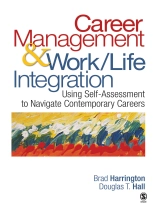Career Management & Work/Life Integration: Using Self-Assessment to Navigate Contemporary Careers is a comprehensive, easy-to-follow guide to managing contemporary careers. Although grounded in theory, the book also provides an extensive set of exercises and activities that can guide career management over the lifespan. Authors Brad Harrington and Douglas T. Hall offer a highly useful self-assessment guide for students and other individuals who want to deal with the challenge of succeeding in a meaningful career while living a happy, well-balanced life.
Key Features
- Bridges theory and application: While the book helps readers gain a better understanding of theories on careers, work life, and human resources, it also guides them to develop a tailored, personalized career strategy for themselves.
- Offers a rigorous self-assessment process: Serving as the book′s foundation, this self-assessment guide gives readers a wealth of information and insight regarding their own career priorities and strategies.
- Provides a more thorough experiential view than existing books: This book integrates work from both the career management and the work life field while most academic literature treats these two areas separately.
Intended Audience
Career Management & Work/Life Integration is a great resource for employers and career planning offices. This book will also by ideal for undergraduate and graduate courses in Career Management; Leadership Development; Organizational Behavior; and Human Resource Management in the departments of business, management, and organizational psychology.
Instructor′s Resources
Available upon request, an instructor′s resource CD accompanies the book and includes such teaching aids as Power Point slides, and teaching notes for each chapter, as well as assignments, key concepts, and terms for each chapter.
विषयसूची
Preface
Acknowledgments
1. Understanding the New Career
Three Career Cases
The Barnes Family
Helen Casey
The Smith Family
The Changing Landscape of Careers
The Changing Nature of Families
The New Careers
Our Career and Work-Life Model
2. The Self-Assessment Process
The Basic Areas of Self-Assessment
Reflecting on the Past
Identity as a Core Competence
Clarifying Your Values
Understanding Your Interests and Passions
Lifestyle
Understanding Life Goals and Personal Vision
Skills Assessment
Summary
3. Integrating Your Self-Assessment and Developing Implications
Integrating Your Self-Assessment
Developing Themes from Your Data
Step 1: Coding Your Data
Step 2: Grouping Your Data
Step 3: Assigning Tentative Themes
step 4: Constructing the Final Themes With Supporting Data
Sample Themes
Developing Career and Work-Life Implications
Summary
4. Finding Ideal Work
Job Loss
Assessing the Labor Market
Identifying the Right Opportunities for You
Job Search Tools
References
Résumés
Starting a Professional Portfolio
Cover Letters
Conducting the Job Search
Networking and the Job Search
Informational Interviews
Guidelines for Conducting an Informational Interview
Questions to Ask
Identifying the Ideal Employer
Special Challenges and Tips for International Students Who Want to Work in the United States
Career Decision-Making
Summary
5. Career Development Strategies
Organizational Career Paths
From Career Ladders to Career Lattices
Vertical Careers and Organizational Advancement
Managing Up
Alternative Career Paths-Salzman′s Typology
Backtrackers
Plateauers
Career Shifters
Self-Employers
Urban Escapees
The Portfolio Career
Ongoing Development
Organizational Career Systems
International Assignments
Financial Considerations
Summary
6. Work and Family
Men and Women, Families and Work
Dual-Career Couples
Dual-Career Families
Sources of Stress
Role Conflict
Summary
7. Workplace Flexibility
Flexible Work Arrangements
Flextime
Compressed Work Week
Part-Time and Reduced-Load Work
Job Sharing
Telecommuting
Leaves
Sabbaticals
Other Elements of the Family-Friendly Workplace
The Family-Friendly Workplace Culture
The Dark Side of Flexible Work Arrangements
Summary
8. Career Development Over the Lifespan
Lifespan Development: Are Career and Life Stages Still Relevant Today?
Adult Life Stages
Gender and Life Stages
A New Model for Middle and Later Years: Learning Cycles
The Second (or Third or Fourth) Career
Protean Career and Older Workers
How Do We Tap the Potential of Older Workers?
Use Developmental Relationships
Opt for New and Varied Job Experience
Improve Person–Job Brokering
Use Information Technology
Retirement
How Do I Want to Design My Life for the Thir Phase?
Financial Planning and Careers in Later Life
Summarizing Careers Over the Lifespan
Book Summary
Appendix: Standards of Excellence Index
Bibliography
Index
About the Authors
लेखक के बारे में
Douglas T. Hall: Tim is the director of the Executive Development Roundtable and the Morton H. and Charlotte Friedman Professor of Management in the School of Management at Boston University. He is also faculty director of the MBA program. He has served as acting dean and associate dean of faculty development and faculty director for the master’s programs at the School of Management. He received his graduate degrees from the Sloan School of Management at MIT. He has held faculty positions at Yale, York, Michigan State, and Northwestern universities and visiting positions at Columbia, Minnesota, and the U.S. Military Academy at West Point. Tim’s books include Careers In and Out of Organizations, The Career Is Dead—Long Live the Career: A Relational Approach to Careers, Careers in Organizations, Organizational Climates and Careers, The Two-Career Couple, Experiences in Management and Organizational Behavior, Career Development in Organizations, Human Resource Management: Strategy Design and Implementation, and Handbook of Career Theory. He is a recipient of the American Psychological Association’s James Mc Keen Cattell Award (now called the Ghiselli Award) for research design, the American Society for Training and Development’s Walter Storey Professional Practice Award, and the Academy of Management’s Everett C. Hughes Award for Career Research. He is a fellow of the American Psychological Association, the Society for Industrial and Organizational Psychology, and the Academy of Management, where he served as a member of the Board of Governors and as president of the Organizational Behavior Division and co-founder and president of the Careers Division. Tim is married to Marcy Crary, and he has three children and five grandchildren.












